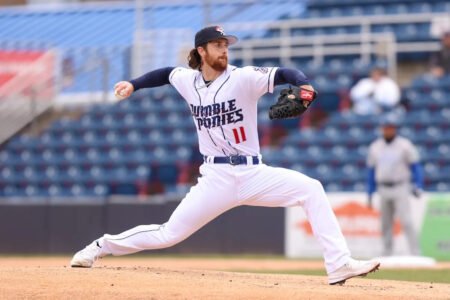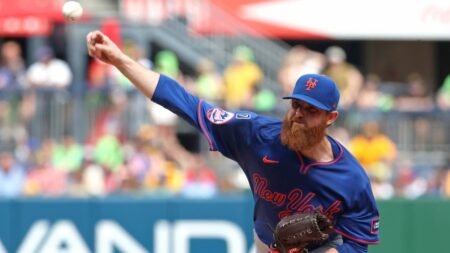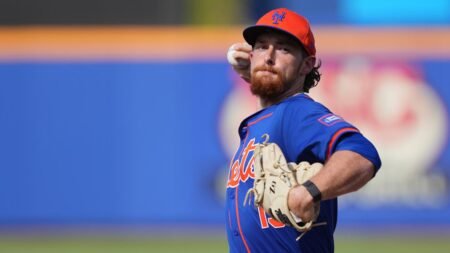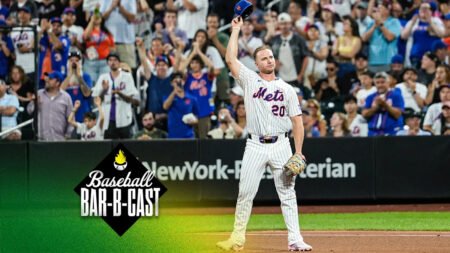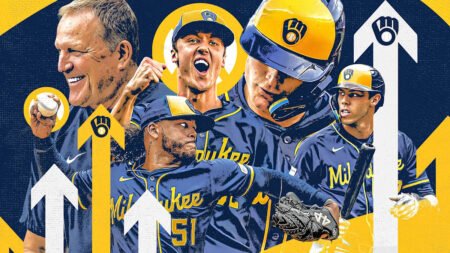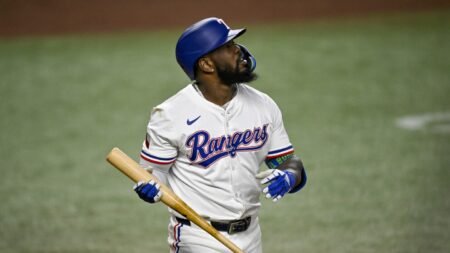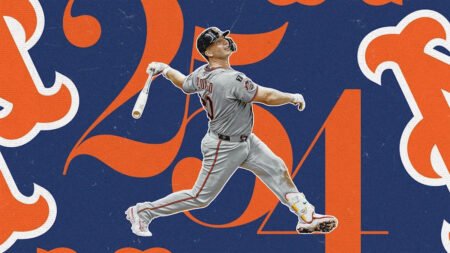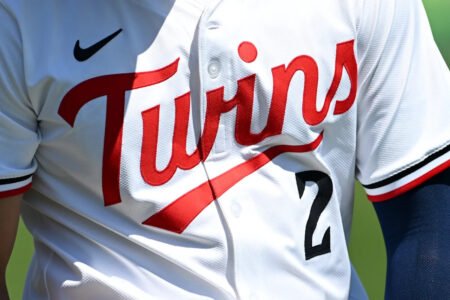In 2021, Times columnist Bill Plaschke incurred the wrath of Atlanta by blaspheming the entertainment district surrounding the Braves’ ballpark as a “sterile shopping mall.” The district, called The Battery, prefers the grand descriptor of “the South’s preeminent lifestyle destination.”
Let’s take a walk around The Battery, so you can understand why it could become one of the flash points in the coming holy war between owners and players.
Advertisement
If you leave the ballpark through the right-field gates, you are in The Battery. You’ll see a plaza in front of you, and around you places to ride a mechanical bull, go bowling, navigate an escape room or take in a concert.
You can eat, drink, shop, dance, stay in a hotel. You can live here, in apartments above the storefronts. You can work here, in office towers housing corporate giants.
“To create an environment where you can spend eight, nine hours at The Battery and the field, and still feel like you have all the time in the world, I think they’ve done a wonderful job building this place,” Dodgers and former Braves All-Star first baseman Freddie Freeman said.
The Braves built all this, not only to lure fans to come early and stay late on game days but to make money from the property 365 days a year rather than 81. On that front, it is a spectacular success: Nine million people come here each year, and the Braves generated $67 million in revenue from The Battery last year.
Advertisement
This, according to major league officials, is the template for the modern team. The Angels had planned a ballpark village twice as large as The Battery. Imagine what the Dodgers could build, and how much revenue they could generate, on property twice as large as the Angel Stadium site.
And, speaking of revenue, Rob Manfred has something he likes to say to players about it. The MLB commissioner spoke at the Braves’ Investor Day last month and said he tells players that their share of the sport’s revenue has dropped from 63% in 2002 to 47% today.
Baseball is the only major sport in America without a salary cap system, in which owners agree to spend a designated percentage of revenue on player salaries.
“If we had made a deal 10 years ago to share 50-50, you would’ve made $2.5 billion more than you made,” Manfred said he has told players, in comments first reported by Sports Business Journal.
Advertisement
Read more: Jacob Misiorowski is the talk of the All-Star Game. Why Dodgers are partially to thank
The players and their union rolled their collective eyes at those comments. It is no secret that many owners want a salary cap, and the cost certainty that comes with it.
“It’s all tactics,” Dodgers All-Star catcher Will Smith said. “It’s all early negotiating stuff.”
Said Arizona Diamondbacks All-Star outfielder Corbin Carroll: “Owners don’t want to put money in our pockets. For them to emphasize how we need this so much, there’s a reason for that.”
Tony Clark, the union’s executive director, said the revenue numbers the league shares with the union are not consistent with Manfred’s statements. And, when you consider a percentage of revenue, you have to define what counts as revenue: What goes into the pool to be shared with players?
Tony Clark, executive director of the MLB players’ union. (Brynn Anderson / Associated Press)
So let’s go back to The Battery, and to the revenue opportunities that such ballpark villages create for teams.
Advertisement
A report released in April by Klutch Sports, the Los Angeles-based agency, called such villages “the sports industry’s $100+ billion growth engine,” particularly as media revenue wanes. Within the pitch to team owners: Those villages “generate attractive financial returns that stand outside of league revenue sharing requirements.”
Translation: You can make all these millions without sharing any of it with the players.
The Braves are building here because the team plays here. That is the new issue looming over the next round of collective bargaining: If a team builds around its ballpark, should that revenue be shared with players?
“Oh yeah,” Athletics All-Star designated hitter Brent Rooker said. “Revenue is just any dollar that teams bring in that ultimately could be turned around and used to put a better product on the field. It’s got to include tickets, TV, concessions, all the things around the stadium. It’s got to include all of it.”
Advertisement
Read more: Agent: Julio Urías has ‘every intention to continue his career’
Is the money a team makes from renting office space outside the ballpark really relevant to the team?
Here’s what Braves president and chief executive Derek Schiller told ESPN about The Battery: “You’ve got a whole other set of revenues from the real estate development that can then be deployed for the baseball team.”
I asked Clark whether, if negotiations turn to the possibility of revenue sharing along the lines Manfred discussed, the money from ballpark villages needs to be part of the conversation.
“Yes,” Clark said.
Advertisement
He declined to elaborate. Understand this about Clark: He can filibuster a yes or no question into a 45-second monologue without actually answering yes or no. That he would say a clear “yes” and nothing else leaves no doubt about his position.
Read more: Hernández: MLB can’t afford to miss out on Shohei Ohtani vs. Aaron Judge in Home Run Derby
If the players do ask that owners share revenue from such ballpark villages, the response would be predictable: First, we share baseball revenue from baseball operations, and real estate developments are not baseball operations. Second, if you want to share in the revenue, you can share in the risk too, by helping to fund construction of the ballpark village, say, or by assuming some of the losses when a tenant drops its lease and leaves storefronts or office buildings unoccupied.
Said Carroll: “I think that’s a conversation that won’t need to happen, because it won’t get to that point. A salary cap is a nonstarter from the union’s perspective.”
Advertisement
Enjoy the All-Star Game Tuesday, because this summer is one of relative peace. The collective bargaining agreement expires after next season, which means the rhetoric between players and owners ought to be flying this time next year. If the owners insist on pushing a salary cap, a lockout almost certainly would follow.
And, if the owners push revenue sharing, The Battery could provide the push for the players’ pushback.
Sign up for more Dodgers news with Dodgers Dugout. Delivered at the start of each series.
This story originally appeared in Los Angeles Times.
Read the full article here






